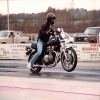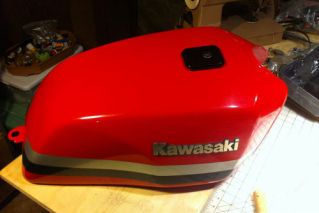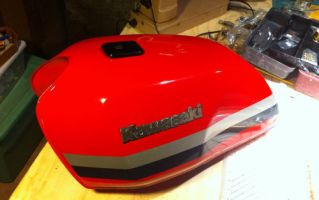tank rust
- gengomerpyle
-
Topic Author
- Offline
- User
-

Registered
- Posts: 616
- Thanks: 17
tank rust
24 Sep 2012 10:14
i bought this tank a couple of months ago and it has so surface rust inside the tank. it doesnt have any scaly rust. ive read on here and other sites about different ways of removing the rust. what is the best way to do it and not have a problem with flash rust? ive heard about using acid, vinegar, naval jelly and some stuff that you can buy at auto part stores.
thanks
thanks
1982 GPZ750R1 ELR
1978 Honda CB750F SuperSport
1971 Honda CB750K
1970 Honda CL100 Scrambler
1978 Honda CB750F SuperSport
1971 Honda CB750K
1970 Honda CL100 Scrambler
Please Log in or Create an account to join the conversation.
- Polar_Bus
-

- Offline
- User
-

Registered
- Posts: 256
- Thanks: 7
Re: tank rust
24 Sep 2012 12:39gengomerpyle wrote: i bought this tank a couple of months ago and it has so surface rust inside the tank. it doesnt have any scaly rust. ive read on here and other sites about different ways of removing the rust. what is the best way to do it and not have a problem with flash rust? ive heard about using acid, vinegar, naval jelly and some stuff that you can buy at auto part stores.
thanks
All's i've ever done to remove light rust is add water and small pebbles into the tank, and then just just do the "shimmy shake". Obviously make sure you blow dry and spray the inside with WD40 to ensure the rust doesn't return...
Bikes:
'84 GPz1100
'06 HD Fatboy
'84 GPz1100
'06 HD Fatboy
Please Log in or Create an account to join the conversation.
- gumby prichard
-

- Offline
- User
-

Registered
- Posts: 230
- Thanks: 1
Re: tank rust
24 Sep 2012 13:39 - 24 Sep 2012 13:42
I WOULD NOT SUGGEST USING WATER. ESPECIALLY IF IT'S ALREADY RUSTED. Flash rust is too difficult to avoid. I have tried lots of stuff, Evaporust, and the BEHR concrete etcher (cheaper route to evaporust) i have also tried cola(since it contains phosphoric acid). i found the Behr concrete etcher is the best for removing rust, BUT it flash rusts so fast, even if you neutralize it with baking soda and water (which is suggested by many people).
Maybe you could try using the behr concrete etcher, and put a chain in there and then after neutralize with a lubricant(like wd40, or oil) instead of baking soda and water. using oil wouldnt hurt anything, you'd just be a little smokey for the first tank of gas, but at least it will lube up your carb components!

Maybe you could try using the behr concrete etcher, and put a chain in there and then after neutralize with a lubricant(like wd40, or oil) instead of baking soda and water. using oil wouldnt hurt anything, you'd just be a little smokey for the first tank of gas, but at least it will lube up your carb components!
78 kz750 twin
77 yz125
91 cr250
99 dr650
ex's:
78 kz400 b1
89 yz80
99 klx300
77 yz125
91 cr250
99 dr650
ex's:
78 kz400 b1
89 yz80
99 klx300
Last edit: 24 Sep 2012 13:42 by gumby prichard.
Please Log in or Create an account to join the conversation.
- taildragger1197
-

- Offline
- User
-

Registered
- Posts: 113
- Thanks: 16
Re: tank rust
24 Sep 2012 14:15
NEVER PUT WATER IN A TANK!!!
Kerosene and clean aquarium gravel then flush with just kerosene. No flash rust to worry about and the kerosene left over from the flush will mix with gasoline. No harsh chemicals to hurt the paint either.
Kerosene and clean aquarium gravel then flush with just kerosene. No flash rust to worry about and the kerosene left over from the flush will mix with gasoline. No harsh chemicals to hurt the paint either.
Union City, Tennessee
1979 KZ1000 LTD B3
1979 KZ1000(1260)LTD S/G Pro ET
1993 ZX11 D1 Ninja
1979 KZ1000 LTD B3
1979 KZ1000(1260)LTD S/G Pro ET
1993 ZX11 D1 Ninja
Please Log in or Create an account to join the conversation.
- Polar_Bus
-

- Offline
- User
-

Registered
- Posts: 256
- Thanks: 7
Re: tank rust
24 Sep 2012 16:10
Well, guess I did my past 3 tanks all wrong by successfully using water, pebbles and WD40.
Remember EVERY tank out there has a small amount of rust on the inside....
Remember EVERY tank out there has a small amount of rust on the inside....
Bikes:
'84 GPz1100
'06 HD Fatboy
'84 GPz1100
'06 HD Fatboy
Please Log in or Create an account to join the conversation.
- 4TheKZ1000
-
- User
-

Public
- Thanks: 0
Re: tank rust
24 Sep 2012 17:31
Well this is a popular thread....have heard a 100 cures for the rust in tanks....I havent had to deal with it myself....yet! I think the Kero seems to work best from what I have seen....heard. Dont know what mixing with gas does??? to carbs....that would be my only question. When done....couldnt you stick some wd-40 sprayed wrags inside the tank and seal it up....when you want to use pull the wrags out????
Please Log in or Create an account to join the conversation.
- gengomerpyle
-
Topic Author
- Offline
- User
-

Registered
- Posts: 616
- Thanks: 17
Re: tank rust
25 Sep 2012 15:09
i took the tank and fender down yesterday to have the paint blasted off of it and i was talking to the company that did the work. they were saying to use muriatic acid with a chain and shake the crap out of it, and then use diluted phosphoric acid to neutralize it and it shouldnt get flash rust. doesnt that sound like it should work? the flash rust is what im worried about once its done.
1982 GPZ750R1 ELR
1978 Honda CB750F SuperSport
1971 Honda CB750K
1970 Honda CL100 Scrambler
1978 Honda CB750F SuperSport
1971 Honda CB750K
1970 Honda CL100 Scrambler
Please Log in or Create an account to join the conversation.
- KZQ
-
- Away
- Administrator
-

Registered
- Walking Behind the Corn May Not Be All That!
- Posts: 4816
- Thanks: 1594
Re: tank rust
25 Sep 2012 16:54gengomerpyle wrote: i took the tank and fender down yesterday to have the paint blasted off of it and i was talking to the company that did the work. they were saying to use muriatic acid with a chain and shake the crap out of it, and then use diluted phosphoric acid to neutralize it and it shouldnt get flash rust. doesnt that sound like it should work? the flash rust is what im worried about once its done.
Flash Rust is not a problem with this method!
One of the most common tasks associated with bringing an older bike back from the dead is figuring out how to deal with the varnish and rust, in the tank, left over from years of neglect. After cleaning many gas tanks, I've finally settled on this method as working best for me. I'm sure there will be refinements and improvements, of which I'll write more about as they evolve.
First of all.
Why do fuel tanks attract moisture?
You park the bike with a quarter tank of fuel probably during the day when it's warmer. That night the temperature drops and as the air inside the tank cools it becomes less able to hold moisture so some of the water vapor condenses. Now this amount of water is insignificant and over night or even a couple of weeks won't usually be a problem. But over a longer period of time, usually months, the tank will breath in every time it cools. That new moisture will condense then when the day warms up the tank will breath out the air that gave up some of it's moisture yesterday. That night as things cool down the tank will take a new breath of damp air and the process starts over again.
What to do if you find rust in your tank.
Is the tank leaking? If it is either Pour 15 or Kreem will solve the problem. Pick one and follow the prep instructions carefully.
If the tank is still holding fuel, I like to check the quality of the steel at critical locations before I go further. To do so, I use a popsickle stick and test the areas adjacent to the seams. Set the tank down and run the popsickle stick along the seams using moderate pressure. Find the lowest part of the tank and test this area as well. If the popsickle stick can't push a hole through the steel there's no need for epoxy sealers. Great, you're bucks ahead and your bike will be worth more as well. As a collector, I've learned to always check the gas tank, not only for rust but to see if the previous owner has had the tank sealed. I judge a sealed tank as hurting the value of a bike more than a rusty tank.
If the popsickle stick reveals soft areas but doesn't actually puncture a hole, It's still a good idea to go with a sealer as the cleaning process may well cause the tank to leak after all.
There are plenty of methods used to clean gas tanks.
I've used sand with steel nuts and kerosene and tumbled them for hours. I gave up on abrasive methods because they take too much time and the sand is too difficult to clean out when finished.
I've used mild acid preparations such as Naval Jelly. These I gave up on because they don't really attack the rust enough to get rid of heavy build ups of scaly rust.
I tried the electric method, using a battery charger and a steel rod. I'm not sure this one accomplishes much. It didn't touch the scale and getting at the top of the tank is tough.
I've read about using sodium hydroxide ( lye ). It's supposed to be a good method because it doesn't erode the base metal. I'm looking forward to an opportunity to try it out.
Most recently, I've settled on a muratic acid wash followed by a dose of phosphoric acid as the best method, mostly because it always gets the job done and doesn't require a lot of physical effort.
To do the job you first have to decide if the tank has scaly rust or just surface rust. If the rust hasn't gotten to the point where it's scaly you can skip the 1/4" nuts, referred to later.
First, flush out any oily varnish that may be coating the lower regions of the tank with acetone or any of those engine degreasers. If you choose the engine degreaser flush the tank with water.
Remove the fuel level sensor. Seal it's opening with GOOD duct tape.
Remove the petcock and seal it up with an appropriate plug or capped section of hose. Dump 30 or so 1/4" nuts into the tank.
Pour in a pint or so of muriatic acid. Seal up the fill spout with GOOD duct tape.
While wearing gloves, old clothes and safety goggles. Agitate the tank for 10 to fifteen minutes. During this time you can monitor the pressure in the tank by watching the duct tape bulging at the fill hole. If too much pressure develops, carefully vent it by peeling the tape back than reseal and keep shaking.
Next pick a piece of concrete that you don't particularly care about. Remove the tape from the sender opening and fill hole and flush the tank with cold water. The acid that has not already been consumed will neutralize itself on the concrete. You're still wearing goggles and gloves right?
Now dry off the openings and reseal them with GOOD duct tape. This time pour in a pint of naval jelly, or milk stone remover or tile haze remover. These are all phosphoric acid formulations. Phosphoric acid is not as aggressive as muriatic acid and therefore is mostly a waste of time if you're trying to really remove rust. What phosphoric acid will really do well is leave the inside of the tank coated with iron phosphate, which is somewhat rust resistant. For this step you do not need much agitation. Just tumble the tank over several times and let it set for a half hour or so and then tumble it again. After about two hours of this and go back to the concrete slab, open the tank, drain it and immediately spray WD 40 into the openings trying to coat as much of the metal as you can. Now flush it out thoroughly with clean water. One more application of WD40 and you're ready to force dry the tank.
Back in the shop, prop a blowdryer so that it forces warm air into the tank and let it blow for an hour or more. Position the tank in different orientations during this process to make sure that no seam holds water. Once it's really dry you're done.
I used to say that the phosphoric acid step was critical to avoid flash rusting. Now, I still think it's a good idea for future rust resistance but since I started spraying WD40 into the still wet tanks, flash rust's no longer a concern.
I've probably cleaned twenty tanks with some variation of this method I've described here and never damaged the exterior paint or eaten through the steel.
Good luck.
Thanks for the interest.
Bill
www.KZ1300.com
Riders:
1968 BSA 441 Shooting Star, 1970 BSA 650 Lightning, 1974 W3, 1976 KZ900, 1979 KZ750 Twin, 1979 KZ750 Twin Trike, 1981 KZ1300, 1982 KZ1100 Spectre, 2000 Valkyrie, 2009 Yamaha Roadliner S. 1983 GL 1100
Projects:
1985 ZN1300
Riders:
1968 BSA 441 Shooting Star, 1970 BSA 650 Lightning, 1974 W3, 1976 KZ900, 1979 KZ750 Twin, 1979 KZ750 Twin Trike, 1981 KZ1300, 1982 KZ1100 Spectre, 2000 Valkyrie, 2009 Yamaha Roadliner S. 1983 GL 1100
Projects:
1985 ZN1300
Please Log in or Create an account to join the conversation.
- donthaveakawman
-
- User
-

Public
- Thanks: 0
Re: tank rust
25 Sep 2012 19:53
i would use heet gas line antifreeze before it happens again, but if you go to z1enterprises.com they have some stuff that kills the rust and refinishes the lining. i am pretty sure it is called kreem
www.z1enterprises.com/ItemDetails.aspx?i...Rinse&item=TU53-1203
www.z1enterprises.com/ItemDetails.aspx?i...Rinse&item=TU53-1203
Please Log in or Create an account to join the conversation.
- gumby prichard
-

- Offline
- User
-

Registered
- Posts: 230
- Thanks: 1
Re: tank rust
25 Sep 2012 20:05gengomerpyle wrote: i took the tank and fender down yesterday to have the paint blasted off of it and i was talking to the company that did the work. they were saying to use muriatic acid with a chain and shake the crap out of it, and then use diluted phosphoric acid to neutralize it and it shouldnt get flash rust. doesnt that sound like it should work? the flash rust is what im worried about once its done.
I used to work at lowes(not that that provides much experience, but we sold both phosphoric acid based concrete etcher and muratic acid), and worked with a guy who knew chemicals wuite well, from what i have been told it is very dangerous to mix phosphoric acid and muratic acid as they are on opposite ends of the ph scale. Just a heads up.
78 kz750 twin
77 yz125
91 cr250
99 dr650
ex's:
78 kz400 b1
89 yz80
99 klx300
77 yz125
91 cr250
99 dr650
ex's:
78 kz400 b1
89 yz80
99 klx300
Please Log in or Create an account to join the conversation.
- DanielTaylor
-
- Offline
- User
-

Registered
- Posts: 9
- Thanks: 0
Re: tank rust
26 Sep 2012 08:36
Why to not use a water to clean a rust? I am using it since a long time and no issues either. Beside I am using a some oil to clean the tank instead cleaning it with a kerosene and other harsh chemicals.
Please Log in or Create an account to join the conversation.
- KZQ
-
- Away
- Administrator
-

Registered
- Walking Behind the Corn May Not Be All That!
- Posts: 4816
- Thanks: 1594
Re: tank rust
27 Sep 2012 12:22gumby prichard wrote:gengomerpyle wrote: i took the tank and fender down yesterday to have the paint blasted off of it and i was talking to the company that did the work. they were saying to use muriatic acid with a chain and shake the crap out of it, and then use diluted phosphoric acid to neutralize it and it shouldnt get flash rust. doesnt that sound like it should work? the flash rust is what im worried about once its done.
I used to work at lowes(not that that provides much experience, but we sold both phosphoric acid based concrete etcher and muratic acid), and worked with a guy who knew chemicals wuite well, from what i have been told it is very dangerous to mix phosphoric acid and muratic acid as they are on opposite ends of the ph scale. Just a heads up.
:huh: :huh: :huh:
I don't believe anybody suggested mixing the two acids. Which by the way are both on the acid (LOWER) end of the PH scale.
The muriatic acid is used first to remove the heavy rust and then, after rinsing, the phosphoric acid is used to leave the steel coated with a very thin layer of iron phosphate, which is somewhat rust resistant.
Bill
www.KZ1300.com
Riders:
1968 BSA 441 Shooting Star, 1970 BSA 650 Lightning, 1974 W3, 1976 KZ900, 1979 KZ750 Twin, 1979 KZ750 Twin Trike, 1981 KZ1300, 1982 KZ1100 Spectre, 2000 Valkyrie, 2009 Yamaha Roadliner S. 1983 GL 1100
Projects:
1985 ZN1300
Riders:
1968 BSA 441 Shooting Star, 1970 BSA 650 Lightning, 1974 W3, 1976 KZ900, 1979 KZ750 Twin, 1979 KZ750 Twin Trike, 1981 KZ1300, 1982 KZ1100 Spectre, 2000 Valkyrie, 2009 Yamaha Roadliner S. 1983 GL 1100
Projects:
1985 ZN1300
Please Log in or Create an account to join the conversation.
Moderators: Street Fighter LTD



